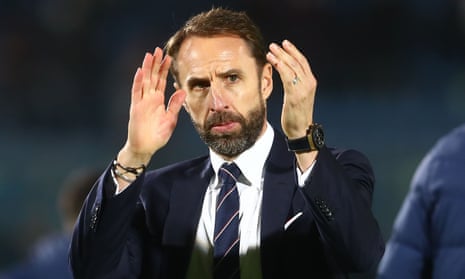Gareth Southgate says the decision to extend his England contract was driven by the dream of clearing one last hurdle to success at a major tournament, ensuring he sees his team realise their rich potential.
The two-year extension means Southgate will remain manager until December 2024, taking in that year’s European Championship after the 2022 World Cup in Qatar. Although he could potentially double his previous salary of £3m, the terms are performance-based and any increases would be funded partly by tournament prize money.
Assuming he remains in place at the contract’s conclusion Southgate will have occupied the position for more than eight years, making him England’s longest-serving manager since Bobby Robson. Only Walter Winterbottom and Alf Ramsey would have spent more time in the job.
Under Southgate’s guidance England have progressed from being a side, when he initially took over as caretaker in September 2016, that had just crashed out of Euro 2016 against Iceland to one that has reached a semi-final and a final in its past two major tournaments. He explained the lure of going one step further made it hard to consider leaving.
“In football, when you’ve got a team who are a good team, when you’ve done a lot of the work culturally to get them to where you want to be and you’ve got them to a point where they can challenge, then you want to bring that to fruition,” he said.
“You want to have a go. We’ve only ever won one World Cup and we still have the belief that that’s possible. It’s an aim we should have as a team and to step away at a moment where we still think the next few years can be very exciting, that would have been difficult to live with.
“We’re allowed to dream and we’ve set ourselves high challenges. Did we think three years ago at this point we’d be sitting here on the back of a semi-final and final? Well, we could have all hoped but it might not have been a realistic dream.”
Quick GuideHow do I sign up for sport breaking news alerts?
Show
- Download the Guardian app from the iOS App Store on iPhone or the Google Play store on Android by searching for 'The Guardian'.
- If you already have the Guardian app, make sure you’re on the most recent version.
- In the Guardian app, tap the Menu button at the bottom right, then go to Settings (the gear icon), then Notifications.
- Turn on sport notifications.
England have won 15 of their 19 matches in 2021 and Southgate, whose assistant Steve Holland has also signed a new contract, suggested similarly relentless form would put them there or thereabouts.
“We’re in tournaments where the margins are so fine but the levels of performance and consistency with the team, particularly this calendar year, have been exceptional,” he said.
“That’s what we have to continue. We have to be a machine that keeps delivering those performances.”
Last year the Football Association announced plans to prepare for a £300m loss over a four-year period to 2024, making 124 positions redundant as the Covid-19 pandemic bit. Mark Bullingham, the FA’s chief executive, said the performance‑related element made Southgate’s new contract affordable and that increases in commercial revenue will also contribute to any pay rise.
While Southgate is aiming for on‑pitch success in Qatar there have been questions about how England’s setup will respond to the human rights concerns that dog the tournament, with decisions over any public stand yet to be taken. He reiterated he is continuing to “educate myself” about the situation but said recent unsavoury episodes have sharpened his players’ awareness of wider problems.
“We went to Montenegro, we went to Bulgaria as a team and suffered from the racism in the stadiums and it was very clear that it was affecting our team, it was affecting the lives of our players,” he said. “It meant that we became much more aware of dealing with those issues as a collective and individually.”
As a member of Uefa’s working group on workers’ rights, Bullingham travelled to Qatar in August to meet migrant workers and charities. He believes that, while next year’s host country has made progress in passing new laws to protect workers, implementation is still lacking. “What is very clear … is that the legislation isn’t being applied universally, and that has to be the next step, and that’s where we see the real progress will come through.”

Comments (…)
Sign in or create your Guardian account to join the discussion